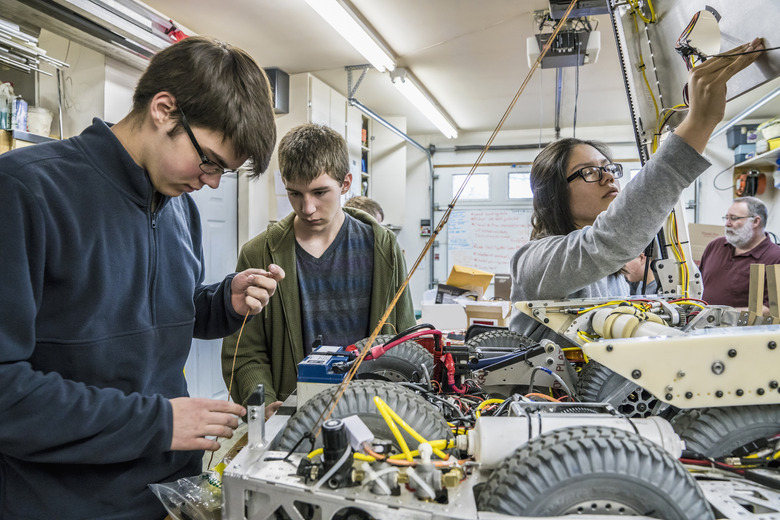How To Choose The Right Science Fair Project For You
It's science fair season! And if you're searching for project ideas and coming up empty, don't worry — we've got your back. See, most great science fair projects fall into one of just a few categories. We've laid out the five main types of projects below, so you can find out that works for you. Remember, though, always check with your teacher or science fair coordinator to see which types you are allowed to choose from. Let's get going!
1. Experiment or Investigation Projects
1. Experiment or Investigation Projects
Investigation projects are probably what you think of when you picture science experients — you come up with a hypothesis, perform an experiment to test it, then draw a conclusion based on those results. And there are plenty of experiments to choose from, like testing which cleaning solution works best to clean pennies, finding the average number of hours a cat sleeps in a day, or determining which building materials can withstand the greatest forces.
During your presentation, you'd go over your hypothesis, explain how you came up with your experiment design, and share your results and conclusion. And, of course, you can chat about any relevant background information or research.
2. Demonstration Projects
2. Demonstration Projects
Not up for designing a brand new experiment? Try a demonstration project, where you'll recreate a classic experiment, instead. Since the experiment has already been done by someone else, you already know what results to expect.
Instead, you'll set yourself apart by explaining how the experiment works — like what scientific principles are involved, the procedure for the experiment, and maybe even its relevance or impact on science overall. N
Need some inspiration? Examples of demonstration projects include showing how vinegar dissolves eggshell, showing the relationship between length and period of a pendulum, or showing how placing a flower in colored water changes the flower's color because of the function of the stem.
3. Research or Description Projects
3. Research or Description Projects
If your favorite way to study is to head to the library and read all the books, you might love a research or description project. This kind of project involves a deep dive into the research to learn about and understand a scientific principle or phenomenon. This might include researching how the digestive system works, how rainbows are formed, or how pH paper changes color. In these projects, you will research until you have a clear understanding and can explain the concept.
In your presentation, you should include detailed explanations of the phenomenon with clear diagrams, and steps laid out in detail if you are describing a process. You might also include models to further illustrate your topic. And, of course, you would want to include a list of sources.
4. Engineering, Building or Modeling Projects
4. Engineering, Building or Modeling Projects
If you're more of a hands-on learner, a building or modelling project might be just the thing to stand out at the science fair. In this sort of project, you make something using or demonstrating scientific principles. You might use baking soda and vinegar to make a volcano, for instance, or build and fire a model rocket. You might also design a potato launcher, for example, or create a working model of the human heart.
Part of your presentation will mean showing off your creation, off course. But make sure to include a detailed description of the scientific principles that went into your building or modelling, too. Walk visitors the step-by-step procedure of how your model or object was built and how it functions, and show off the model itself. You might also draw comparisons. Does your solar-powered model car work 75% more efficiently than others you've researched? Make sure to show that off!
5. Collection Projects
5. Collection Projects
Finally, you've got collection projects — a science project where you seek out, collect and display a series of objects. A collection project could be simple, like a showcase of the different leaves or the different you found in your neighbourhood park. It could also be more involved, like a collection of all the different species you found in a square meter of your backyard.
During your presentation, you'll want to include descriptions for your objects, and note (and explain) the similarities and differences between them. A more involved form of this type of project could demonstrate differences of scientific interest, such as how the type and quantity of bugs varies in areas of pesticide use, for example.
While a collection project can be fun, make sure you also do it safely. Some state and federal parks have rules about taking objects from them, so make sure you're in the clear before you start collecting.
Cite This Article
MLA
TOWELL, GAYLE. "How To Choose The Right Science Fair Project For You" sciencing.com, https://www.sciencing.com/types-of-science-fair-projects-13724054/. 15 January 2020.
APA
TOWELL, GAYLE. (2020, January 15). How To Choose The Right Science Fair Project For You. sciencing.com. Retrieved from https://www.sciencing.com/types-of-science-fair-projects-13724054/
Chicago
TOWELL, GAYLE. How To Choose The Right Science Fair Project For You last modified August 30, 2022. https://www.sciencing.com/types-of-science-fair-projects-13724054/
